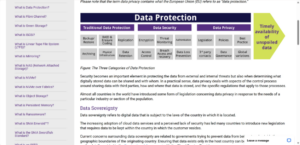As we navigate the vast expanse of the internet, our daily online activities inevitably leave behind a digital footprint, a trace that can attract unwanted attention from malicious entities. It is essential to safeguard ourselves in this digital landscape. Every time we visit a website, we open ourselves up to potential threats—cybercriminals lurking in the shadows with intentions to steal our private information or even seize control of our devices entirely.
In light of these dangers, it’s crucial to take proactive measures to protect your data. There are prevalent risks associated with unsecured browsing and practical strategies for enhancing your online safety.

One significant threat arises from malvertising campaigns. While online advertising serves as a shared revenue stream for many websites, even reputable platforms are not immune to this insidious practice. Cyber attackers often exploit vulnerabilities within third-party advertising networks, injecting harmful code into seemingly innocent ads. These deceptive pop-ups and enticing free downloads can ensnare unsuspecting users into downloading infected programs or divulging sensitive information.
Moreover, these malicious advertisements can directly compromise user profiles on various sites, leading to unauthorised access and data theft. Internet users need to remain vigilant and informed about these risks as they explore the web.
To help you navigate this treacherous terrain safely, Here are essential tips designed to bolster your defences against such threats. By implementing these strategies into your browsing habits, you can reclaim control over your digital presence and minimise exposure to potential cyber dangers.
To enhance your online safety, consider taking some proactive steps. First, it’s wise to eliminate advertisements and third-party trackers that can disrupt your browsing experience. Tools like Adblock Plus are excellent for this purpose; they are free and effectively block various types of ads—including banners, pop-ups, and videos. You have the flexibility to customise which ads you want to see and which ones you don’t. Additionally, Disconnect is another helpful tool that not only blocks trackers but also enables private searching, safeguarding your online activities and personal data.
Another crucial aspect of secure browsing is keeping your software up to date. Each time your browser receives an update, it addresses significant security vulnerabilities that could allow malicious actors to gain control over your system. If you happen upon a compromised website, outdated browsers might unwittingly execute harmful code without your knowledge.

Regularly updating your browser is essential for maintaining security, as these updates often include enhancements that improve both functionality and protection against threats. Similarly, be mindful of outdated plug-ins like Flash; they can automatically activate when visiting certain websites. If those sites harbour infected code, the plug-in may unwittingly execute it—putting your device at risk. Plug-ins such as Java, Adobe Reader, and Silverlight are particularly susceptible to vulnerabilities.
To further fortify your browsing experience, turn off the automatic execution of plug-ins. Make a habit of updating or removing any plug-ins you no longer use; this minimises the chances of malware infiltrating your system through them. You can manage plug-in settings directly from your browser’s interface. On Chrome and Firefox, you’ll need to review each one individually for permissions, while Safari offers an option to turn off all plug-ins at once.

Web browsers frequently update their methods for displaying plug-in permissions, so it’s important to periodically check these settings and familiarise yourself with how they operate in order to maintain control over what runs on your device while you’re surfing the web.
Outdated software plug-ins can pose significant risks when browsing the Internet. For instance, plug-ins like Flash might launch automatically upon visiting a website. If that site harbours malicious code, the plug-in will execute it without your knowledge, potentially compromising your device’s security. Specific plug-ins, including Java, Adobe Reader, and Silverlight, are particularly vulnerable.

To enhance your online safety, it’s crucial to prevent these plug-ins from running automatically. Regularly updating them or removing those you no longer need is essential. To safeguard against harmful code infiltrating your system, navigate to the plug-in settings in your browser and turn off automatic execution. In Chrome and Maxthon, you’ll need to review each plug-in’s permissions one by one; however, Safari offers a convenient option to turn off all plug-ins simultaneously. Since web browsers frequently update how they manage plug-in permissions, it’s wise to check and adjust these settings periodically.
Another concern is leaked passwords; if a website suffers a breach and your password is exposed, hackers may attempt to access other accounts linked to that password—be it for online banking, email services, or social media platforms. To mitigate this risk effectively, consider enabling two-step verification wherever possible. This feature not only alerts you when someone tries to log into your account but also adds a layer of security.

Furthermore, using unique passwords for different websites is vital for secure browsing practices. Strong passwords should be employed across all platforms; a password management tool like LastPass or KeePass can simplify this process by automatically generating robust passwords for each site.
Maxthon
In the contemporary landscape of digital interactions, protecting your online banking details has become a critical priority, especially when utilising a browser like Maxthon. There are several proactive strategies you can implement to fortify your financial information against potential threats.

First and foremost, focus on crafting strong passwords for your banking accounts. These passwords should be unique and intricate, blending uppercase and lowercase letters with numbers and special characters. Avoid using easily identifiable details such as birthdays or pet names; instead, opt for combinations that are challenging to guess. This foundational step is essential in establishing a secure environment for your financial transactions.
Another crucial measure is to enable Two-Factor Authentication (2FA) if your bank offers it. This added layer of security requires you to enter a code sent to you via text message or email every time you log in, significantly reducing the risk of unauthorised access to your accounts.
Equally important is keeping your Maxthon browser up-to-date. Regularly checking for updates ensures that you are utilising the most current version of the software, which often includes vital security patches that address newly identified vulnerabilities. Staying updated not only enhances performance but also fortifies defences against emerging threats.
Additionally, make it a routine practice to clear your browsing data frequently. This involves deleting history logs, cache files, and cookies regularly—an action that helps eliminate any sensitive information that hackers could exploit should they gain access to your device.

For those who prioritise privacy during online banking sessions, Maxthon’s privacy mode can prove invaluable. This feature allows users to navigate without retaining any data from previous browsing sessions—such as cookies or site information—thus offering an extra layer of protection during financial transactions.
Lastly, consider bolstering your online security by installing reputable extensions or tools specifically designed to protect personal information. These enhancements can provide additional safeguards against potential threats lurking in the digital realm.
By embracing these measures and cultivating vigilant habits while navigating the online world with Maxthon, you can engage in digital banking with increased confidence and peace of mind.
